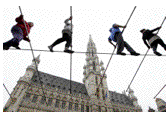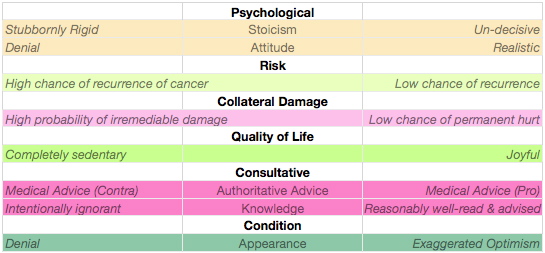Tags
anger, attitude, blood pressure, Book of Job, childhood, community, conservation, debilitating, depression, dictate, dictation, Dominican, energy, exercise, extremities, glucose reading, neuropathy, offer it up, pain, painlessness, parents, peripheral neuropathy, pickup truck, pills, reorientation, self-absorption, self-attention, self-awareness, side-effects, Sisters, stairs, tingling, touch-typing, transformation, walking
Dear Friends,
Prologue
The reason for the long hiatus since my last blog posting is that I have been experiencing difficulty accurately touch-typing. For me, this has been extraordinarily frustrating, and personally very discouraging. The experience led to my being more than a little depressed. After spending too much time (by my estimate) in the doldrums, I fired-up a computer application that has been lying dormant on my computer ever since I aquired it in the hopes that it could generate—from the audio track of a completed episode—a printed transcript of a GLOW[1] episode, a task for which it proved entirely unsuitable. The program is a voice-activated dictation application.[2] It works well when a speaker devotes a modicum of time “teaching” it the nuances of one’s particular diction and typical vocabulary. It quite dramatically fails to interpret voices with which it has had no previous exposure or training.
So I’ve devoted the last few days to learning about the program and tutoring myself to master the delicate art of dictation. The program is admirably written and comparatively easy to learn (as much as learning an unfamiliar computer program is ever “easy”). Dictation is a skill that was far more common in the generation previous to mine. It fell all but completely out of use in my “do-it-yourself” generation. It has only been recently revived when computer processing power allowed its complex implementation to be ported onto computer platforms. I’m employing this clever program to generate the text of this blog. It is going remarkably well and gives me great encouragement.
But I’m finding that articulating my thoughts, out loud, constitutes a distinctly different creative process than letting my thoughts tumble around in my mind, in silence, before I commit them to the keyboard. For me, even if no one is present to hear them, speaking my thoughts out loud, before I’m ready, just feels a little like a violation of some of my privacy. I’ve no doubt it would feel differently for an extrovert! Fluent dictation will take some time and adjustment. I am curious to learn what kinds of differences will result from having to verbalize my thoughts ahead of their being written. Creativity, in my observation, has always been inspired by facing constraints, so I’m curious to find what changes are in store for the future.
In the meanwhile, I’m pleased to assert that, in what follows, any spelling errors or typographic faux pas are completely the responsibility of my software. They will not be my responsibility (this time)![3] 🙂
Summary
Imagine a pick-up truck moving along steadily at 30-odd miles per hour. The pickup truck is a metaphor for the regularly-scheduled chemo infusions I’ve, until recently, been receiving. Now imagine that a pile of bricks had been loaded onto the bed of the truck, conveniently positioned by the rear gate. The bricks represent the multitude of effects the chemotherapeutic infusions have had on my body: both beneficial and damaging.
When I terminated my bi-monthly infusion treatments—seven weeks ago, now—I had, metaphorically speaking, slammed on the brakes of my pick-up truck, bringing it to an abrupt stop. I expected that I would immediately feel better. I wanted the ill effects of my treatment to cease as abruptly as the pickup had.
What I’d neglected to consider is that a load of bricks has its own mass and momentum, entirely independent of the pickup truck. This meant that—though the truck had stopped—the bricks would continue their forward motion, sliding along on the bed of the truck until their energy was dissipated by friction (or until they collided with the cab). Simple physics. Why hadn’t I thought of that?
Detail
The particular “brick” that has most bothered me in the aftermath of terminating my chemo infusions is peripheral neuropathy. It is a condition that adversely affects the extremities (fingers and toes, prime, among others). There are other medical conditions that are associated with it, but peripheral neuropathy is a well-recognized effect of cancer treatments. In my case, my neuropathy only really became evident after my infusions were terminated (after the pickup truck had braked to a halt). What’s worse is that the effects, far from being diffused by time, have become increasingly debilitating as the days have passed. My oncologist suggests patience. She assures me that the symptoms will disappear, but prepares me for the fact that it may take months… or even years.
Neuropathy causes the extremities to tingle, be painful and be particularly sensitive to cold. It appears that (like my damaged taste buds) the affected nerve endings at the extremeties of my body send confusing signals to my brain. In my case, my fingers are not sensitive enough to discriminate when they are on the “home keys” of my computer keyboard. My fingers dutifully aim at the correct keys, but seem unable to recognize the physical properties of my fingers to discern (or adjust to) when they’ve lighted on the proper keys. Something similar is true of my feet. I must be especially careful going downstairs because my feet give me the impression of landing on the tread several inches earlier than my physical feet actually touch the step. The other day, while walking across the patio, I distinctly felt as if I were going downhill and executed a little running step to slow down my momentum. Of course, since there was no reason to slow down, my running step looked like part of a little unnecessary dance routine. But, at least, it was not dangerous; whereas losing my balance or trusting in an erroneous depth perception is an altogether possible danger. So I’ve become attentive.
These, and related sensations, can provoke frustration and even anger. I am not prone to anger. I am well aware that my cancer justifies feelings of anger, and that for many patients, being afflicted with cancer likely arouses legitimate feelings of anger. I am not one of these, as far as I can tell. Anger belongs to a fundamental complement of emotions experienced by human beings. But I have never experienced the beneficial effects of personal anger. At most, my anger gives me a temporary relief from some stress. But it replaces my relief with a considerable bit of stress of its own. While I can admit that many individuals may benefit from expressing anger in ways I have not yet learned, anger has never proven (for me) to provide a solution to what may have caused it in the first place. Instead, faced with the kind of frustration and discouragement that peripheral neuropathy causes me, I tend to seek out alternatives that can overcome the limitations of my experience… such as a dictation system that can eliminate or replace my reliance on keyboards.
I’m curious about why it is that I don’t rely on anger as much as others of my friends do. I wonder what it was that dampened the value of this emotion in my personality. I have an early memory about learning to deal with pain or frustration. It suggested an alternative to anger. The alernative was taught me by my parents and was reinforced by the Dominican Sisters who were my elementary school teachers. When, as a child, I became obsessed by things beyond my control; or when I suffered a physical pain that was not life-threatening (but seemed worth exaggerating for the pity it might evoke), I was routinely advised to “offer it up.” What was meant by this suggestion was that my pain—taken in a broader context—could be transformed, by dint of my own attitude, from something negative into something beneficial. By “offering up” my ‘negative’ suffering I, myself, could convert it to some equivalent “positive energy” for someone else in need of it.
As a child, I interpreted this action as having an immediate effect. If I generously offered up my pain (and ceased complaining about it), someone else in the world for whom I dedicated my pain, might feel a lightening or compensating relief of their own pain; or a soul “in Purgatory” might ascend from that temporary confinement to a more complete participation in the joys of Paradise. It was the equivalent of the physical Law of the Conservation of Energy; only this had to do with the “Conservation of Painlessness”.
As an adult, these explanations involve an acquiescence to an entire theological construct. Such a construct may or may not be as compelling as it may have been in childhood. Or, for those not raised as I was, such a transformation of pain into benefit might not even seem to have any validity at all. But, as I think about it today, it would be foolhardy to dismiss the lessons given by wise mentors to children. Doing so risks dismissing, as childish nonsense, the underlying message my teachers were intending to convey. To consider the suffering of the world, when one confronts one’s own suffering, is an admonition that has enormous (and somewhat forgotten) value. One has only to read the Book of Job to realize there are more complex issues at stake than one’s personal suffering.
One of the least appealing aspects of my illness is its necessary focus on self-awareness. I am admonished to monitor my blood pressure several times a day. I am asked to take a glucose reading in the mornings and evenings. I have an assortment of pills to take at different times during the day. I must guard my nutritional intake. I must partake of sufficient exercise. I become, perforce, increasingly sensitive to routine things I formerly took for granted (such as touch-typing or merely walking).
It is well and good that I pay attention to such details. But one of the enemies of a balanced personality (and a serious impediment to a reciprocal community life) is self-absorption. Self-absorbtion is perilously proximate to self-awareness, especially the kind of self-awareness that arises from and is prompted by discomfort and pain.
So, as I struggle with a user interface resulting from thousands of lines of inanimate software code and an unnatural-feeling but remarkably-effective method of textual input; employed for the purpose of overcoming the (in the larger context, trivial) inconvenience of a neuropathic by-product of the treatment of my life-threatening illness, I am altogether grateful for my childhood upbringing that taught me to step outside my self-attentive discomforts to dedicate them for the lifting of pain, in general, from a pained world.
As a child, I had no doubt about the efficacy of my attitudinal reorientation; no doubt that my pain could be redirected to remediate pain elsewhere. As an adult, I can but hope and trust that something of the sort still really will happen. At the very least, its good for me to believe that it will.
Chet
Notes
[1] http://www.greatlibraries.org
[2] http://www.nuance.com/for-individuals/by-product/dragon-for-mac/dragon-dictate/index.htm
[3] I couldn’t help myself… after the program was through transcribing my dictation, I hurriedly scanned and corrected the (remarkably few) typographic oddities that had been incorporated in the text. Homophones and homonyms seem to be sources of difficulty. I’ll do a bit more “training exercises” before attempting my next blog posting.



